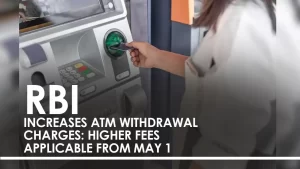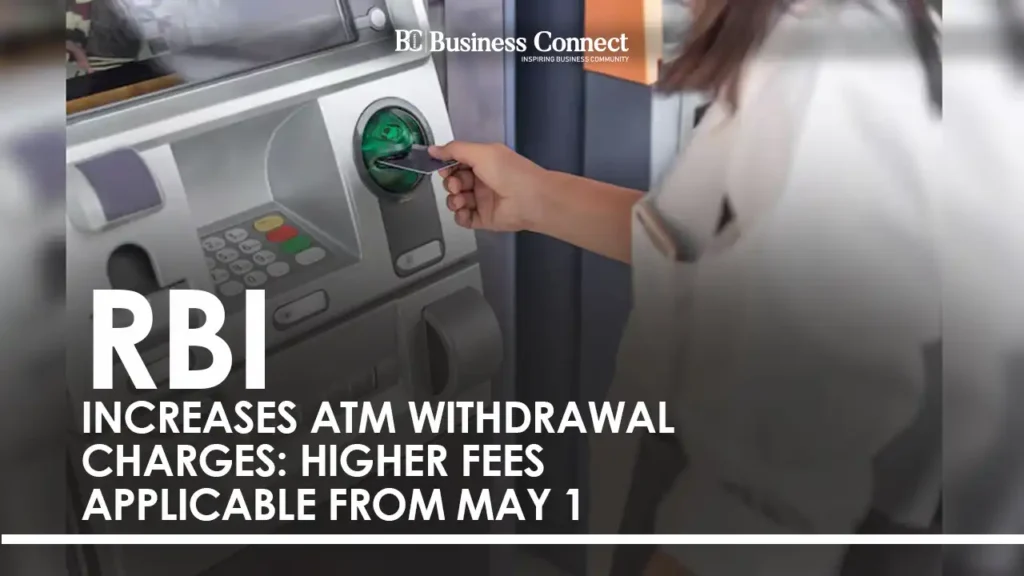The RBI has indeed approved an increase in ATM interchange fees, which will lead to higher costs for customers withdrawing cash from ATMs beyond their free transaction limits. This change is set to take effect on May 1, 2025. Specifically, the interchange fee for financial transactions (like cash withdrawals) will rise from Rs. 17 to Rs. 19 per transaction, and for non-financial transactions (like balance inquiries), it will increase from Rs. 6 to Rs. 7.
RBI Increases ATM Withdrawal Charges: Higher Fees Applicable from May 1
Additionally, the maximum fee that banks can charge customers per transaction beyond the free limit will go up from Rs. 21 to Rs. 23, plus applicable taxes like GST.
The free transaction limits remain unchanged: customers are entitled to five free transactions (financial and non-financial) per month at their own bank’s ATMs. For other banks’ ATMs, it’s three free transactions in metro cities and five in non-metro areas. Once these limits are exceeded, the new fees will apply.
This hike stems from a proposal by the National Payments Corporation of India (NPCI) and was supported by white-label ATM operators, who argued that rising operational costs necessitated the increase. The RBI confirmed this adjustment in a circular issued on March 28, 2025, aligning with the current date.
This change will likely affect frequent ATM users, especially those relying on other banks’ ATMs, and may push more people toward digital transactions like UPI, which the government has been promoting as a cost-effective alternative.

About the RBI’s increase in ATM withdrawal charges effective May 1, 2025:
- What changes are happening to ATM fees starting May 1, 2025?
The RBI has increased the ATM interchange fee for financial transactions (e.g., cash withdrawals) from Rs. 17 to Rs. 19 and for non-financial transactions (e.g., balance inquiries) from Rs. 6 to Rs. 7. The maximum fee banks can charge customers beyond free limits will also rise from Rs. 21 to Rs. 23 per transaction, plus GST. - When will the new ATM charges take effect?
The higher fees will apply starting May 1, 2025, as per the RBI’s announcement. - How many free ATM transactions do I still get?
The free transaction limits remain unchanged: five free transactions (financial and non-financial) per month at your own bank’s ATMs, and three free transactions in metro cities or five in non-metro areas at other banks’ ATMs. - What happens if I exceed the free transaction limit?
After exceeding the free limit, you’ll be charged up to Rs. 23 per transaction (previously Rs. 21), plus applicable taxes like GST, depending on your bank’s policy. - Why are ATM charges increasing?
The hike was proposed by the National Payments Corporation of India (NPCI) and supported by white-label ATM operators due to rising operational costs. The RBI approved it to address these concerns. - Will this affect all ATM transactions?
No, only transactions beyond the free monthly limits at your own bank’s ATMs (five) or other banks’ ATMs (three in metro, five in non-metro) will incur the higher fees. - How much more will I pay for a cash withdrawal after May 1, 2025?
If you exceed your free limit, the maximum fee per withdrawal could be Rs. 23 (up from Rs. 21), plus GST, which could add roughly Rs. 4-5 extra per transaction depending on tax rates. - Who announced this change?
The Reserve Bank of India (RBI) confirmed the fee increase in a circular issued on March 28, 2025. - Will this push people away from using ATMs?
It might, especially for frequent users of other banks’ ATMs. The government and RBI have been promoting digital alternatives like UPI, which are often free or cheaper. - Can banks charge more than Rs. 23 per transaction?
No, Rs. 23 is the maximum fee cap set by the RBI for transactions beyond the free limit, though banks can charge less at their discretion, plus applicable taxes.
Add Business Connect magazine to your Google News feed



